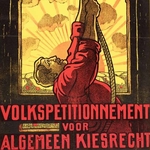Civil Society or Democracy? A Dutch Paradox
DOI:
https://doi.org/10.18352/bmgn-lchr.7120Keywords:
Civil Society, DemocracyAbstract
Since the 1990s, research has been carried out worldwide into the relationship between ‘civil society’ (an organised, self-aware society) and the formation of democracy. Dutch historians have to date shown little interest in this field of research, although the case of the Netherlands is an interesting one, both historically and in terms of current affairs. This article makes a case for the relevance of Dutch history to the debate on civil society in relation to three points.
Firstly, where civil society is a phenomenon of the eighteenth and above all the nineteenth centuries, the society of the Republic demonstrates that a corporatist order can show characteristics of a civil society. Secondly, the factor of religion can be an important element in the promotion of social commitment. Thirdly, Dutch history flags up a paradox: it seems that a highly developed, civil society can rather limit than promote the need for political democracy and the recognition of an independent political sphere.
This article is part of the special issue 'The International Relevance of Dutch History'.
Downloads

Downloads
Published
Issue
Section
License
Authors who publish with this journal agree to the following terms:
a) Authors retain copyright and grant the journal right of first publication with the work simultaneously licensed under a Creative Commons Attribution 4.0 International (CC BY 4.0) that allows others to share the work with an acknowledgement of the work's authorship and initial publication in this journal.
b) Authors are able to enter into separate, additional contractual arrangements for the non-exclusive distribution of the journal's published version of the work (e.g., post it to an institutional repository or publish it in a book), with an acknowledgement of its initial publication in this journal.
c) Authors are permitted to post their work online (e.g., in institutional repositories or on their website) prior to and during the submission process.
Authors are explicitly encouraged to deposit their published article in their institutional repository.







